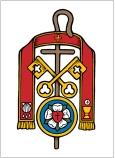I just saw on Facebook a friend of mine share a blog post from somebody else titled, “If you’re thinking about marrying a farmer, stop.” It made me think about my life as a pastor’s wife, and I figured I would write a similar thing.
If you’re thinking about marrying a pastor (or seminary student), you should think about what your life will be like.
You will never look at other pastors the same way again.
You will likely not feel like you have your own pastor again. Maybe not until your husband retires. I don’t know, we’re not there yet.
You will be a single parent on Sunday mornings and for most church functions. On Sunday mornings my husband is leading the service and preaching, so I’m always sitting with our children by myself unless we’re on vacation. And at church dinners and other functions, he’s working the room to make sure no one feels like he doesn’t love them and doesn’t want to say hello to them that day.
You will begin to despise the sound of a cell phone ringing.
You just might be left without your date/husband at a church Christmas dinner party when one of the party guests needs to be rushed to the hospital and he goes along to comfort the family.
You may have to sacrifice being near family and friends to follow God’s Call to lands unknown. Sometimes those lands are only 12 miles away from your mom, and sometimes they’re 1,000 or more. Your new church becomes your support group, and that can be a beautiful thing. Not to mention, mass communication makes living far away so much easier.
You may learn how to can food when you receive an abundance from parishioners’ gardens.
You may find that your children talk to everyone they encounter because they are used to people from church asking them how they are and giving them Christmas gifts. They receive more attention than most other children from church because church people love their pastor and his family.
You will understand best how sin affects the world around us as you may be brought into many people’s personal sufferings. Your husband certainly is. You may get to know those hurts or you may not, but your husband will know them all. That takes a toll on him. He will not be the same person that you married after he has served as a pastor for a few years.
Since he will be aware of the problems of most of the families in your church, you can’t be a nag. Being a pastor’s wife will teach you how to be a better communicator so that your husband can have a peaceful home.
You may go years without knowing the names of the people you talk to every Sunday. Everyone will know your name, but they will forget that they only have a few new names to remember (your husband + you + your kids) and you have dozens, and they won’t think to reintroduce themselves on a regular basis until you have their name committed to memory. And unless you’re bolder than I am, you may feel awkward asking them their names multiple times. I can’t tell you how many times I’ve asked my husband, “who was I talking to just then?”
You may be given a car that a parishioner was getting ready to part with anyway, just because one of your cars died.
You may get to live in the largest, nicest home you’ve ever lived in since moving out of your parents’ house when your church has a nice parsonage for you.
You may get to learn all kinds of new things about different kinds of people by living in different kinds of places. We’ve lived on Long Island, NY, in suburban St. Louis, MO, and small town North Dakota. We’ve had churches filled with businessmen, doctors, dentists, nurses, teachers, and farmers. God’s people are everywhere and they are kind and loving people wherever you go. That makes new environments easier to adapt to.
You may learn that picking a church based on finding friends for your kids is the wrong attitude. We would much rather our kids be founded on the Word of God with a sure faith in Jesus than be surrounded by lots of children their ages. Granted, a pastor doesn’t get to just pick the church he serves unless another church Calls him. Then he has to choose between where he already is and the other place.
You may find that you need to have hobbies to make friends outside of church where you aren’t known as the pastor’s wife. Or you may find that you don’t know anybody where you live outside of your church, because the church is your life. That will depend on your personality.
If you’re like my husband and me, your perpetual joke will be, “see you in Heaven.”
You will have friends/acquaintances all over the country/world by developing relationships with other pastors and their families and the people that attend whatever congregations your husband serves over the years.
You may end up somewhere where people are very critical of your parenting, or you may end up somewhere where people are very understanding about children. We’ve been both.
You may feel like a failure as a wife and a mother, but that’s just a normal part about being a woman! Forgiveness and communication are vital aspects of a good relationship. Remember those things, and even if you’re crazy enough to marry a pastor, you will live a happy life where you can’t imagine living any other way.


 My husband is a pastor. I met him when he was a Seminary student, so his intention to serve Christ and the Church has always been a part of our life, the center of our life, really.
My husband is a pastor. I met him when he was a Seminary student, so his intention to serve Christ and the Church has always been a part of our life, the center of our life, really.
 are going, and determining his gifts, passions, strengths, and weaknesses and which place he could serve best. He is a very perceptive, analytical, and thoughtful man. He can and will think of all angles during this deliberation process.
are going, and determining his gifts, passions, strengths, and weaknesses and which place he could serve best. He is a very perceptive, analytical, and thoughtful man. He can and will think of all angles during this deliberation process.